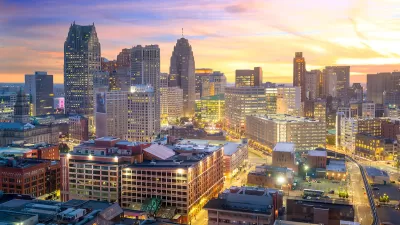Neither technology nor infrastructure shows any limit for how big or how fast cities can grow and more megacities are on the horizon, according to this piece from Richard Dobbs and Jaana Remes.
Representing the McKinsey Global Institute, Dobbs and Remes argue that perceived limitations in technology and infrastructure will continue to fade away, and growing cities will have to contend with the real issue: management.
"Does this imply that the future will be one of massive megalopolises spread across the globe? Theoretically, the answer is yes-there is no limit to the size of cities. In practice, however, the growth of most urban centers is bound by an inability to manage their size in a way that maximizes scale opportunities and minimizes costs. Large urban centers are highly complex, demanding environments that require a long planning horizon and extraordinary managerial skills. Many city governments are simply not prepared to cope with the speed at which their populations are expanding.
Already there are plenty of examples of dysfunctional cities across Africa, Asia, and Latin America. Without skillful management, cities become centers of decay, gridlock, crime, urban sprawl, slum housing, and pollution. The quality of life deteriorates and economic dynamism falters-scale diseconomies outweigh scale benefits.
These challenges are most acute in the megacities-cities with more than 10 million inhabitants."
FULL STORY: What’s the biggest limit on city growth? (Hint: it's not steel or cement)

Americans May Be Stuck — But Why?
Americans are moving a lot less than they once did, and that is a problem. While Yoni Applebaum, in his highly-publicized article Stuck, gets the reasons badly wrong, it's still important to ask: why are we moving so much less than before?

Using Old Oil and Gas Wells for Green Energy Storage
Penn State researchers have found that repurposing abandoned oil and gas wells for geothermal-assisted compressed-air energy storage can boost efficiency, reduce environmental risks, and support clean energy and job transitions.

Placekeeping: Setting a New Precedent for City Planners
How a preservation-based approach to redevelopment and urban design can prevent displacement and honor legacy communities.

San Francisco’s Muni Ridership Grew in 2024
The system saw its highest ridership since before the Covid-19 pandemic, but faces a severe budget shortage in the coming year.

Colorado Lawmakers Move to Protect BRT Funding
In the face of potential federal funding cuts, CDOT leaders reasserted their commitment to planned bus rapid transit projects.

Safe Streets Funding in Jeopardy
The Trump administration is specifically targeting bike infrastructure and other road safety projects in its funding cuts.
Urban Design for Planners 1: Software Tools
This six-course series explores essential urban design concepts using open source software and equips planners with the tools they need to participate fully in the urban design process.
Planning for Universal Design
Learn the tools for implementing Universal Design in planning regulations.
Heyer Gruel & Associates PA
City of Moreno Valley
Institute for Housing and Urban Development Studies (IHS)
City of Grandview
Harvard GSD Executive Education
Salt Lake City
NYU Wagner Graduate School of Public Service
City of Cambridge, Maryland




























